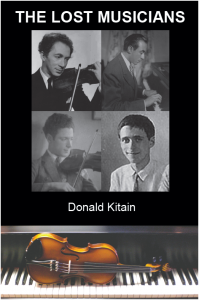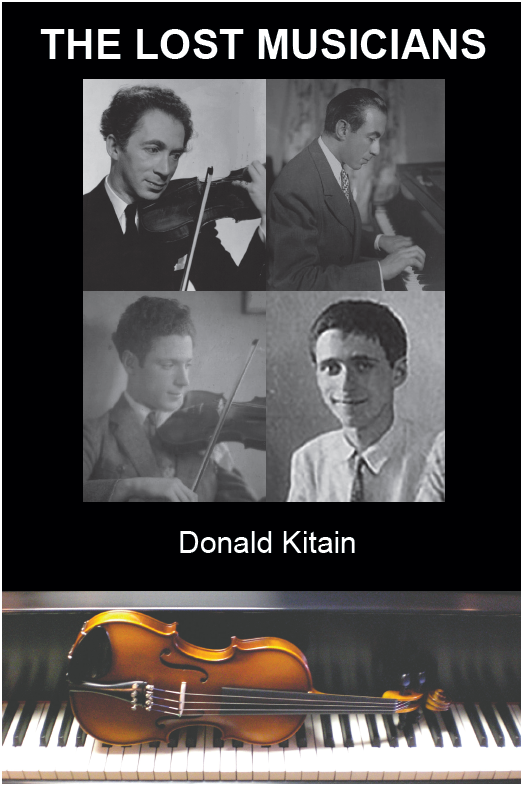 PRODUCT DESCRIPTION:
PRODUCT DESCRIPTION:
Here is the sometimes heartbreaking and often humorous true story of four intensely musically gifted brothers who lived and performed around the world for nearly eight decades. This reader friendly book follows their perilous lives and inspiring loves, their bright successes and deadly disappointments. Their history as Jews serves as a reminder of the terrible risks they took just to survive. This is essential reading for anyone interested in music and life during the twentieth century and the history of the time as it unfolded. Amazingly, much of their music is still available and rivals anything heard today. Their harrowing escapes and misfortunes during the Russian Revolution, World War I, the Holocaust and World War II, and their emotional lives after the wars provide an unparalleled testament to the power of life, love and hope.
Related Videos:
YouTube – Chopin Revolutionary Etude Op 10 No 12
YouTube – Robert and Anatole Kitain play Estrellita circa 1955
YouTube – Anatole Kitain plays Bach’s Jesu, Joy of Man’s Desiring
YouTube – Grand Valse
YouTube – Robert and Anatole Kitain play Slavonic Dance No. 2 by Dvorak
BUY NOW: Barnes & Noble | Amazon.com
Composers & Musicians – General | ISBN: 978-0-9836771-8-5 | 280 pages | Published June 2011
Click here to return to bookstore
READ AN EXCERPT BELOW
PROLOGUE
ROYAL GIFT
NOBODY WAS PREPARED FOR WHAT THEY WERE about to experience. They had heard reports about the two performers, but many were skeptical. Two hundred and fifty royal guests completely filled the hall. At the front of the stage three rows of seven armchairs each held the honorary guests. A balustrade separated the orchestra pit at the front of the stage from the auditorium.
The festivities began early in the evening. The year was 1913. The palatial Hermitage Theater in St. Petersburg, Russia, sat on the banks of the Winter Canal and was considered a jewel of Russian architecture. Among the guests were Czar Nicholas II, Anna Pavlova, the great Russian ballerina, Feodor Chaliapin, the most famous Russian opera singer of the twentieth century, and other members of the Imperial Family.
In addition, two young brothers waited in the wings off stage to be introduced…eleven-year-old Robert Kitain, who played the violin, and ten year old Anatole Kitain, who was a very small figure next to the huge grand piano.
Designed by the Italian architect Giacomo Quarenghi, the Hermitage Theater’s seats were fashioned for the imperial family and aristocratic court to be entertained by the leading entertainers of the time. The palatial theater was completed in 1787 and embodied the opulence and extravagance of the Czarist regimes.
Chairs were upholstered in red velvet, thick carpets covered the floors, Statues of Apollo and the nine Muses sat in recesses along the walls, bas-relief portraits of famous musicians and poets adorned the walls, and candle-lit chandeliers gently illuminated the amphitheater. But the most important characteristic of this theater was the acoustics. Clear and distortion-free sound could be heard from any seat.
The semicircular hall was filled to capacity. Men wore black dress coats that contrasted sharply with the pale Russian skin of the women in attendance. Soft light from the large chandeliers reflected off extravagant diamond necklaces and earrings worn by the women. The dazzling reflections from the abundant jewelry could have been a distraction, but did nothing to detract from anyone’s appreciation of the music and performances of Robert and Anatole.
In a small pit, separated from the rest of the hall by large marble columns, sat Czar Nicholas II, his immediate family, and the Grand Duchess Maria Pavlovna. Maria Pavlovna loved music and was now President of the Russian Academy of Fine Arts, a position she most likely would not have had were it not for the fact that she was a relative of the Czar. She was regarded as one of the most celebrated socialites in St. Petersburg and frequently entertained well-respected musicians including Rachmaninoff, Rimsky-Korsakov, Chaliapin and many others. In 1918 she would become the last of the Romanovs to escape from Revolutionary Russia and the Bolsheviks.
Mendel Kitain stood quietly and proudly just off stage watching and listening intently as his children mesmerized the audience. The faces of the crowd were clearly visible. Their reactions justified what he had anticipated. They all sat still and listened intently, absorbing every note, while his children played. At the completion of their performances the entire audience stood and enthusiastically applauded what they had just witnessed.
The applause continued for several minutes. The beaming Mendel walked on stage and stood next to Robert and Anatole. The brothers were barely able to speak. Even though they were young artists they were still used to applause. But on this day they had a feeling of much greater accomplishment.
Their youthfulness and small bodies completely delighted the nobility that was present. They seemed so delicate for their age. Their perfect musical technique in combination with their small stature was compelling to everyone present.
In awe of the event, Robert and Anatole hesitantly tried to bow in appreciation of the thunderous applause. They were not used to so much royalty. Everywhere they looked all they could see were high-ranking men in formal outfits or dark suits. Women were adorned in fancy outfits and dazzling jewelry. They turned to their father for guidance.
Mendel eagerly directed his children. He first raised his voice towards Anatole, “Well, keep bowing. You see that lady? Send her a kiss. Make sure you bow towards the Czar and his family, keep bowing…” He did the same with Robert, motioning where he should bow and kiss.
Finally, the applause subsided. The Czar whispered something to Maria Pavlovna, who slowly rose and walked onto the stage. She invited the boys to approach her and embraced them like long lost children. It happened so fast the boys were caught off guard. The fleeting glimpse they caught of her reminded them of a doting aunt. The smile that spread across her soft features reflected kindness and love.
“A great future awaits you,” was all she said. Then she called someone from off stage and whispered something to him.
A few minutes later, a servant brought a violin case and handed it to Robert.
“Open it …gently,” said the Grand Duchess.
Robert opened the case and froze. Sitting on the bright blue velvet that lined the case, shining and reflecting the candelabra light, was a violin.
“That is for you, boy. You deserve this violin.” The Czar had insisted that Pavlova present this to Robert. “He was wonderful,” he had told her.
She had given Robert a magnificent 200 year-old Joseph Guarnerius violin from the Romanoff collection of instruments. Debate continues to this day whether a Guarnerius or Stradivarius is a more prized instrument. The gift was a rare honor that was bestowed upon Robert.
Robert was speechless. He could not take his eyes off the brilliant shining dark stained instrument. It was something he never expected but would always cherish.
Robert tried to speak but instead choked softly. After a moment, he slowly regained his voice. He looked at the Grand Duchess and softly spoke. “Thank you.” Then both brothers stood together with their father and bowed towards the Czar again. The Czar nodded approvingly.
For probably the first time in his life Anatole regretted that he played such a large instrument like the piano. Children and jealousy go hand in hand. Certainly, he had performed well and everyone appreciated his talent. But at that moment in time his thoughts were only on his brother’s gift.
A piano, of course, was not something that could be gift-wrapped like a violin. But this inconsistency was not relevant to Anatole. Even later in life, after Anatole would become world-renowned, he would still remember the disappointment of that day.
Click here to return to bookstore
